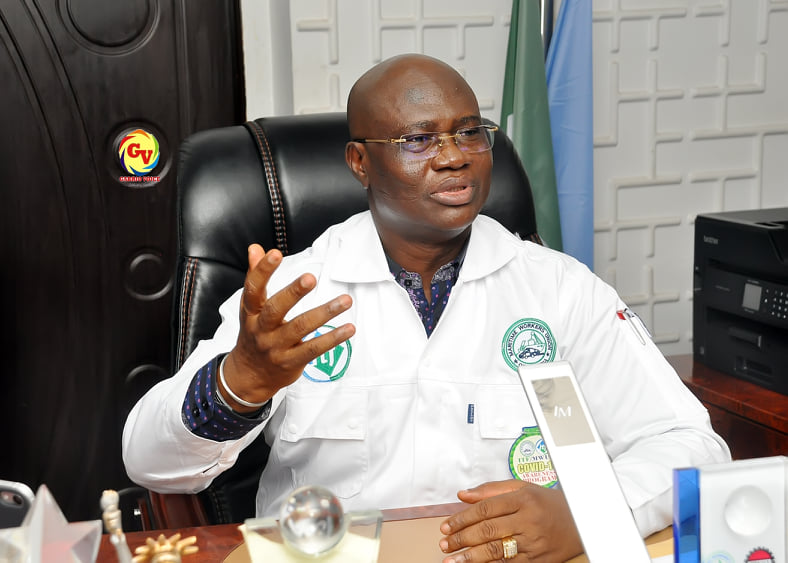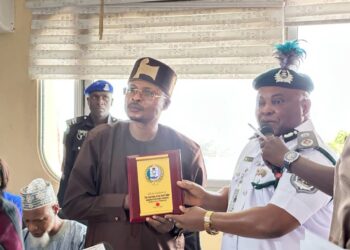In this joint interview with Com. Adewale Adeyanju; President General Maritime Workers Union of Nigeria (MWUN) and Com. Akinola Bodunde, President of Senior Staff Association of Statutory Corporations and Government Owned Companies (SSASGOC), NPA branch, they raised alarm on the negative impact of the proposed deduction of 50 per cent of the revenue accruable to the Nigerian Ports Authority


Can you explain the main concerns expressed in your recent press briefing regarding the implementation of presidential directives on the 50% automatic deduction from Internally Generated Revenue of Federal Government Owned Enterprises, including NPA
The main concern revolves around the potential detrimental impact on the Nigerian Ports Authority (NPA) due to the significant deduction from its internally generated revenue. This deduction threatens the NPA’s ability to fulfill its corporate responsibilities effectively.
Can you elaborate on how this deduction would affect the NPA’s ability to carry out its corporate duties?
The deduction would severely hinder crucial operations such as constant dredging of port channels, regular maintenance of quay aprons, and upkeep of ports, jetties, and terminals. These activities are vital for safe and efficient maritime operations.
Even when NPA had the 100 percent funds, the quay aprons were not repaired?
The issue of quay apron in Apapa has been there for the past three years and every year we have been shouting for the government to give them approval to do it from the money generated. We pay NPA money directly to the Central Bank through the TSA, so we don’t have the right to take any naira from it. Even though your money is getting there, the government is removing it from source without even your knowledge, you only see their alert. And when the money is not there, which money do you want NPA to use to rehabilitate the port?
Rehabilitating the port requires serious money. It’s not Naira and Kobo, it is Dollars. This is because the majority of the equipment will be shipped in and the majority of the contractors will be from abroad. It’s not simple money. And for now, if you want NPA to do it, it is either you give them an opportunity or you give them a waiver or you increase the money NPA needs.
Since the beginning of TSA, we have not been in control of our revenue. Inasmuch as we are not in control of the revenue, there is little or nothing you can do in taking the money for any capital project.
If you have an idea of NPA’s expenditure, what makes you think that 50% will not be enough for NPA to fulfill its financial obligations in ports?
Last year, the budget provision for NPA was N300bn. This year, they increased it to N500bn but let me tell you, you work in the port and Journalists go to the port. How many ships are coming? Go to Roro Terminal at PTML here, we launched our biggest ship a month ago. That vessel is supposed to carry about 5,000 cars but they came with 200 cars. This is because in the port, we don’t pay levies on cars.
They pay levies on brand new cars to encourage local production. But presently, we pay levies on Tokunbo cars. Don’t be surprised if you go for a 2006 Corolla, you need about N2.5 million naira to clear it. This is because you have about N1.2 million for duties and about another N1.2 million for levies and that levy originally was for brand new cars. That’s why importers are not Importing. To clear a 40ft container is about N15 million. How many people are bringing it in? And you still want us to generate. How to make the N500 billion this year is only the grace of God with the present situation on ground because ships are not coming in.
Every year, we have a budget. We monitor it at the union and we know the budget provision. That’s the capital and the overhead costs and if you even look at the overhead costs, you will realize that in majority of the budgets, 60% go to capital projects and the capital projects are all these issues we mentioned in the port which are the rehabilitation of the port, the quay apron, the NEPA and the likes.
You know, mostly in the ports, we run on generators permanently. All the port locations run on generator power of about 800 liters per day. If it’s a company that’s producing, NPA by now would have closed down by about a year or two because the situations are terrible.
The government is only interested in bringing money. But when you are bringing money, some of the policies are affecting the operation of the port. The issue of custom duty and exchange rate, you can’t remove NPA from that crisis. We are the major people that are suffering from the exchange rate and the Custom duties. If you put all those in place, how do you want us to generate revenue? I was surprised when I saw a write up that Customs should generate N5 trillion in the port. Where? How many people are importing? Go to the port. The port is scanty. Go to Roro Terminal. Go to SIFAX. How many cars do you see there? That is the major problem. But if facilities are okay, NPA can generate money and can feed this country. But some of the policies are the problem the maritime sector is facing generally. And until the government clears it, we cannot go anywhere. That is why they are still doing all these things that are affecting us, assuming they take 50% from the little that remains for us to service the port and to run overhead costs. Do you think it will be sufficient? And that is why the union is shouting now. If you don’t want us to work, tell us you don’t want us to work. If you want us to work, give us resources and let us work in an environment that will favor us and that will favor the government as a whole.
We Know NPA collects 7% Surcharge that must have accrued to billions of Naira, what are they doing with it?
That 7% you are talking about is not the NPA that is collecting it. It is NIMASA and you can’t add it to our revenue. It’s not our revenue. Port development belongs to NIMASA and you know they pay it directly to the TSA account. All money generated by NIMASA goes to the TSA account and the government removes 50% from the source and we are now battling with the remaining revenue and that is why we have all these problems. That is why we have to shout now for the government to listen to us. Failure to do so, we will withdraw our members.
You mentioned the importance of manpower development. How would the deduction impact the NPA’s workforce and its ability to compete in the maritime industry?
A significant deduction would hamper manpower development efforts, hindering the NPA’s ability to maintain a skilled and competitive workforce. In a specialized field like port operations, a well-trained workforce is essential for productivity and efficiency.
Your statement also touches on the NPA’s corporate social responsibilities. How would the deduction affect these initiatives, particularly in challenging environments like the Niger Delta?
The deduction would likely leave the NPA financially strained, making it difficult to fulfill its corporate social responsibilities, especially in regions like the Niger Delta. Failure to address these responsibilities could exacerbate tensions and lead to unrest, impacting operations in the area.
Finally, you provided a recommendation in your statement. Could you explain the proposed solution and its potential benefits?
Certainly. We recommend that only 30% of the internally generated revenue be automatically deducted, allowing the NPA to retain 70% to cover overhead costs and fulfill its statutory responsibilities effectively. This approach would help maintain operational efficiency while ensuring the NPA can continue to serve its stakeholders adequately.















